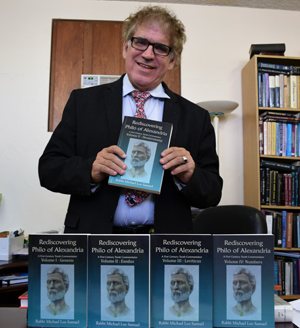
With the coronavirus threatening people’s health in the first major pandemic we have seen in over a hundred years, Jewish tradition has much to say about the importance of handwashing. As a “priestly people,” (Exodus 19:6), priests in the Torah were always instructed to wash their hands whenever they enter into the Tent of Meeting or upon entering the Temple.
Just how serious is this precept?
The scriptural verse teaches, “They shall wash their hands and their feet, so that they may not die: it shall be a perpetual ordinance for them, for him and for his descendants throughout their generations. (Exodus 30:21). The failure to wash one’s hands is serious enough to completely invalidate the priest’s services he conducted. As Maimonides noted:
- This scriptural verse teaches us that any service conducted by a priest whose hands and feet are unwashed is invalid. The חָק־עוֹלָם “perpetual ordinance” also reappears in the laws regarding the priestly garments, וְהָיוּ עַל־אַהֲרֹן וְעַל־בָּנָיו בְּבֹאָם אֶל־אֹהֶל מוֹעֵד אוֹ בְגִשְׁתָּם אֶל־הַמִּזְבֵּחַ לְשָׁרֵת בַּקֹּדֶשׁ וְלֹא־יִשְׂאוּ עָוֹן וָמֵתוּ חֻקַּת עוֹלָם לוֹ וּלְזַרְעוֹ אַחֲרָיו “Aaron and his sons shall wear them whenever they go into the Tent of Meeting or approach the altar to minister in the Sanctuary, lest they incur guilt and die. This shall be a perpetual ordinance for him and for his descendants” (Exodus 28:43). From the similarity of expressions, the wording conveys a mutual point. Just as a priest who lacks the priestly garments invalidates the priestly service, so too the priest who has neglected to sanctify himself through the ritual washing of hands and feet as noted earlier.[1]
Handwashing is a daily ritual that begins from the moment we wake up in the morning and thank God for returning our souls to our bodies. Jews have long been accustomed to washing their hands whenever food is served, or whenever leaving a cemetery—the act of handwashing serves to remind us that we must always conduct our affairs with complete integrity and holiness. Before eating bread or a meal, it has long been considered a mitzvah to wash our hands. Before we pray, we wash our hands. After leaving the bathroom, we always wash our hands. Whenever we touch hidden parts of our body, we wash our hands. Rabbinical tradition even considered this act to be one of the most important rituals in the daily life of a Jew. Rabbi Abraham Isaac Kook once explained that our the physical act of eating has the potential to diminish our sense of holiness. But to counteract this influence, we wash our hands before and after a meal.
One of my favorite verses from the Psalms reads:
Who may go up the mountain of the LORD?
Who can stand in his holy place?
The clean of hand and pure of heart,
who has not given his soul to useless things, what is vain.
He will receive blessings from the LORD,
and justice from his saving God.[2]
The act of handwashing is not just a health requirement, it is an act that reminds us that we must sanctify our lives to God in all of our relationships and actions.
Historically, even when Jews lived in the filthy ghettos, Jews continued to wash their hands as prescribed by our tradition. During the period of history when the world suffered from the Bubonic Plague, which has occurred several times over the last 2000 years or more.
- The first documented case of the Bubonic Plague occurred in 542 C.E., where it was known as the Plague of Justinian. This pandemic killed almost 10,000 people in Constantinople.
- In the 700s, almost half the European population perished; estimates of almost 100 million deaths were recorded by the time the pandemic subsided.
- In the 14th century, China lost over 25 million people.
- Between 1346 and 1353, over 75 million people perished from the plague.
- The “Black Death” of London killed 70,000 people. [3]
In such dangerous times, the Jew has often been accused of being the agent that caused these plagues in Europe. Fortunately, Jews were often able to avoid the effects of the plague—by a ratio of 50% less than their Christian neighbors. When the Christian anti-Semites noticed this, citizens often banded to kill the Jew. In Strasbourg, Austria, in 1349, nearly 2000 Jews were killed. The Jewish communities of Mainz and Cologne were exterminated at this time. Interestingly, Jews stopped observing the Tashlich ceremony on Rosh Hashanah, lest they be accused of poisoning the water.
A personal note: My father Leo Israel Samuel was a Holocaust survivor who had served as a tailor in several concentration camps. He told me that one of the hardest problems he faced was keeping himself clean in the camps; disease was everywhere. He was determined to do his best to keep his body clean and healthy. What did he do? He would bathe naked in the winter snows. The Nazis found it amusing, but he persevered. As a child, sometimes anti-Semitic kids would call us “you dirty Jew!” but Father would have us say, “No, I am not a dirty Jew. I bathe twice a day!” His tongue-and-cheek humor always proved endearing—but in retrospect, I think he was speaking from his actual experience at the Auschwitz camp!
The famous biblical commentator Abraham Ibn Ezra wrote that if someone was suffering from gonorrhea, he recommended that he had to be scrupulous in thoroughly washing his hands. Once he does so, if his hands touch the food of another, the food will not become ritually impure (Commentary on Leviticus 15:2).
Ibn Ezra’s insight is valuable in terms of the history of medical science history. Most people seldom realize the importance of handwashing is from the perspective of medical hygiene. Here is a brief article I shall quote which tells the remarkable and tragic story about a Hungarian obstetrician-gynecologist, Ignaz Phillips Semmelweis (1818–1865), a Jewish immigrant whose serendipitous medical discovery in a Vienna hospital changed the practice of medicine forever.
The medical world was a radically different place from what it is today. Back in 1846, Dr. Ignaz Phillips Semmelweis joined one of the most prestigious medical staffs in the European world. When he arrived, he discovered at the time that hospital virulent infections which ensued after surgeries led to an astounding 45% mortality rate. New mothers were faced with a 25% death rate. Bear in mind, this was before Louis Pasteur would eventually discover the Streptococcus bacteria responsible for childbed fever back in 1878. Nor would penicillin be discovered until 1928.
Within a month of his arrival at the famous Viennese hospital, to Dr. Semmelweis’s chagrin, he discovered that 36 out of 208 women died following the delivery of a baby, a mortality rate of 17 percent. One maternity ward in particular, suffered from 451 infectious-related deaths, while a second maternity ward lost only 90 women. He wondered about why was there such a discrepancy.
One day, he came across an expectant mother, who was crying because the Hospital administration assigned her to the medical students’ ward, instead of the midwives’ ward. Everyone knew that the students’ ward had a much higher mortality rate, and to be assigned was tantamount to a death sentence. The woman later died.
But one day in 1847, a friend of Dr. Semmelweis’s friend accidentally cut himself with a scalpel while performing an autopsy of a woman who had died from the disease physicians back then called “childbed fever.” Semmelweis’s friend soon died himself. After personally attending his friend’s autopsy, to Semmelweis’s surprise, he observed that the lesions on his friend’s body were exactly the same as the lesions seen on the women dying from childbed fever.
The pieces of the puzzle finally came together, as Semmelweis realized that the same poisonous substance which had come from the diseased cadaver, must have entered his friend’s cut finger resulting in death. This same substance was apparently being introduced into women after childbirth by the hospital physicians and students who came to examine them with unwashed hands immediately after performing autopsies on the victims of childbed fever. Before then, many causes of the malady were sought, including mother’s milk, foreign doctors, fear, and medical student incompetence. The notion clicked that maybe the reason the death rate was so high on the students’ ward was that they were participating in autopsies, not because they were incompetent. The midwives were not studying medicine, so they did not attend the autopsies. Semmelweis excitedly ordered all the students and doctors to wash their hands thoroughly with a calcium chloride solution and clean sand after each autopsy. The death rate fell from one out of six to one out of 100 within a year.
Shortly thereafter, an outbreak of sepsis occurred on the ward, killing 11 out of 12 women. This outbreak began after a pregnant woman with infected cervical cancer was assigned to the first bed in the row. Realizing that the infective material must have spread from this woman, Semmelweis insisted that all the physicians and students not only wash their hands after autopsies, but between patients on the ward. Later he also isolated the badly infected cases. By 1848 the mortality rate was so low on these wards that during one month no death from childbed fever was reported.
Throughout all these events, Semmelweis made a number of enemies. People found his personality to be difficult; he was also moody, unstable, and arrogant. Furthermore, other physicians complained he often ordered them to perform novel, burdensome sanitary techniques, and he often met great opposition. He bluntly called his opponents to these hand-washing techniques “murderers.” His conflicts with supervisors and peers ultimately led to his dismissal in 1850.
And when handwashing ceased at the Vienna hospital, and the death rate again soared. He wrote his classic book concerning his findings in 1861, unfortunately while in a manic state. The words rambled and were difficult to comprehend. The book was a failure, and his mental health deteriorated. In 1865, at 47 years of age, he entered a mental institution. On admission he had a wounded finger on his right hand, probably inflicted during his most recent obstetrical operation. A few days later he died, ironically, of childbed fever.[4]
The moral of this anecdote is to highlight, that one of the most brilliant intuitions of the Torah, is the laws governing bodily hygiene.
Let us now return to our original subject: the current pandemic. To prevent the spread of the coronavirus, remember:
- Wash your hands frequently.
- Regularly and thoroughly clean your hands with an alcohol-based hand rub
- or wash them with soap and water.
Let us do our part in minimizing the effects of this dangerous pandemic.
When the Israelites were being chased by the Egyptians, our ancestors found themselves surrounded by the Red Sea, the wilderness and an army of Egyptians closing in on them. Remarkably, God told Moses to go through the sea, and so they did. Sometimes we find ourselves in a similar situation where the only thing we can do is wade through the danger together and find strength from each other until we make it to the other side of the shore.
NOTES:
[1] MT Hilkhot Bi’at HaMikdash 5:2.
[2] Psalm 24:3-5.
[3] Scott, Susan, and C. J. Duncan, Biology of Plagues: Evidence from Historical Populations. (New York: Cambridge University Press, 2001)
[4] Sherwin Nuland, The Doctors’ Plague: Germs, Childbed Fever, and the Strange Story of Ignac Semmelweis (New York: W. W. Norton & Company; Reprint edition, 2004).
*
Rabbi Dr. Michael Leo Samuel is spiritual leader of Temple Beth Shalom in Chula Vista. He may be contacted via michael.samuel@sdjewishworld.com










